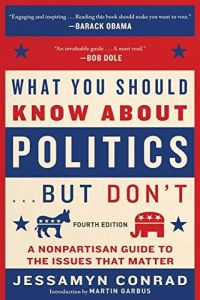Join getAbstract to access the summary!

Join getAbstract to access the summary!
Jessamyn Conrad
What You Should Know About Politics . . . But Don’t, Fourth Edition
A Nonpartisan Guide to the Issues That Matter
Arcade Publishing, 2020
What's inside?
Haven’t been paying attention to US politics? This book will bring you up to speed.
Recommendation
This breezy overview of American political issues presents itself as a nonpartisan cheat sheet for citizens who don’t pay much attention to politics. Consultant Jessamyn Conrad mostly delivers on that promise. For each topic, such as health care or trade, she describes a bit of its history and then delves into a discussion. The book leans heavily on debates and controversies from the George W. Bush era, however; the author does not mention Donald Trump’s trade wars, the sharp political divides of recent years and other current events. Still, this primer offers a solid grounding in a variety of hot topics.
Summary
About the Author
Jessamyn Conrad is a senior consultant at Copperfield Advisory and holds degrees from Harvard, Columbia and Cambridge Universities.
















Comment on this summary